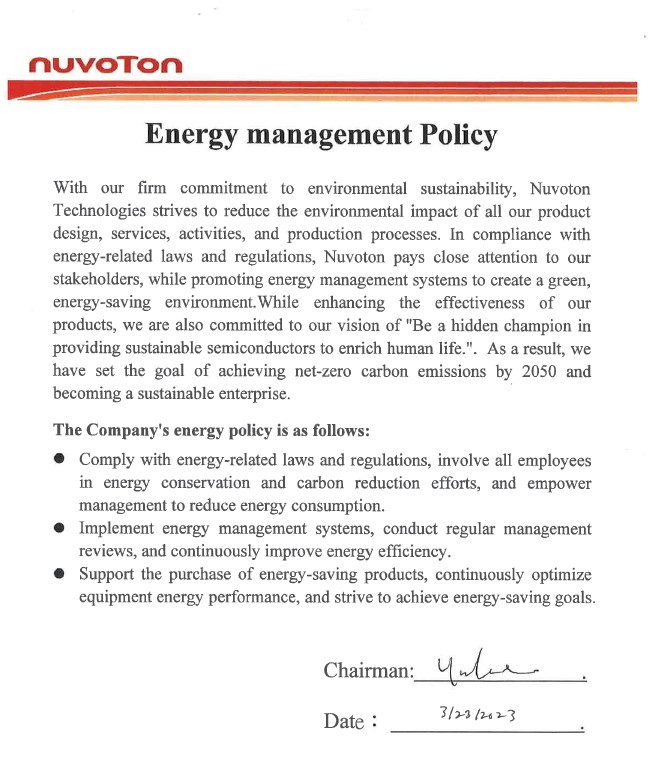Environmental Sustainability|Energy Management
Nuvoton actively reduce the environmental impact of our business operations by investing in innovative technologies and initiating layouts for renewable energy and net carbon zero emissions. We enhance resource use efficiency and implement waste management to respond to the continuously evolving international environmental regulations, extreme climate events, and other risks. By estimating financial impacts and planning management costs in advance, we formulate environmental strategies and build operational resilience for the company.




48.8
%
Approved SBTi Near-Term Target: Commitment to Reduce Scope 1 and 2 Emissions by 2030 Compared to the 2022 Baseline
25
%
Approved SBTi Near-Term Target: Commitment to Reduce Scope 3 Emissions by 2030 Compared to the 2023 Baseline
1163000
kWh
Nuvoton Taiwan's Annual Electricity Saving Achievement in 2024
Energy Management Policy and Commitment
To ensure effective energy management and the implementation of energy-saving projects, Nuvoton has adopted the ISO 50001 Energy Management System and established a Task Force under the Sustainability Development Committee. The task force, composed of facility management and related departments, holds regular energy management meetings to review current status and project progress. It also shares project results and best practices with global sites to continuously achieve energy-saving goals.

Energy Management Strategy
Electricity is the primary energy source for Nuvoton. In 2024, purchased electricity accounted for 95% of total energy consumption in Taiwan, with the remaining 5% comprising natural gas and automotive fuel. Additionally, Nuvoton Taiwan operates self-generated renewable energy, representing approximately 1.4% of total energy consumption. For Nuvoton Japan, purchased electricity accounted for 78% of total energy consumption, while the remaining 22% included liquefied petroleum gas (LPG), heavy oil, and natural gas. Starting in 2025, Nuvoton Japan will introduce offsite renewable energy and non-fossil fuel energy certificates to increase the share of renewable energy.
Nuvoton Taiwan and Nuvoton Japan obtained ISO 50001 Energy Management System certification in 2022 and 2023, respectively, and adopted the PDCA (Plan-Do-Check-Act) cycle to continuously optimize energy management processes. On the action front, Nuvoton actively promotes various energy-saving and carbon-reduction projects, initiates digital transformation programs, implements smart manufacturing systems, and optimizes energy digital integration. The company also continues to support the procurement of energy-efficient products and enhance equipment performance to achieve energy-saving goals.
Energy-Saving Measures
Nuvoton's energy-saving initiatives focus on four key areas
- Installation of Renewable Energy: Deployment of solar power systems with an annual generation capacity of 1,000,000 kWh.
- Implementation of Energy Management Systems: Achieved ISO 50001 certification
- Optimization of System Load Reduction: Adjusted HPA supply pressure from 8.4 to 7.8 kgf/cm², saving 182,000 kWh annually.
- Equipment Replacement: Prioritized procurement of energy-efficient equipment
Key Achievements
- Nuvoton Taiwan: Total energy consumption decreased by 1.88% compared to the baseline year of 2021.
- Nuvoton Japan: Reduced energy consumption in 2024 by 30% compared to the baseline year of 2021.
- Nuvoton Taiwan: Achieving the installation of 8% of the contracted renewable energy in 2023 (Capacity of 819 kW, Generating 1 million kWh annually).
- Nuvoton Japan: Through a power purchase agreement, began sourcing solar energy for the Arai site starting October 2025, with an expected annual purchase of approximately 7 million kWh of renewable energy.
Nuvoton's Energy-saving Achievements in 20241
| Nuvoton Taiwan | Electricity Saving (kWh/year) | Energy Saving (GJ/year) |
|---|---|---|
| Introduce Al control into the chilled water system | 200,000 | 720 |
| Replace 20W LED lights with 13W LED lights | 18,396 | 66 |
| Replace fluorescent lights with LED lights in the 2nd floor maintenance area | 17,975 | 65 |
| Replace electric boilers with natural gas boilers | 220,000 | 792 |
| Replace old pumps in production units | 154,889 | 558 |
| Upgrade production unit chillers to energy-efficient models | 222,633 | 801 |
| LM-1 phase out | 55,000 | 198 |
| Install energy-saving valves (pump outlet) | 72,270 | 260 |
| Optimize high vacuum in operation mode | 149,650 | 539 |
| Upgrade testing plant lighting to LED | 44,080 | 159 |
| Initiate energy saving project for parking canopy lighting | 1,568 | 6 |
| Introduce EPSON ink-jet printer | 6,500 | 23 |
| Total | 1,162,961 | 4,187 |
| Nuvoton Japan | Electricity Saving (kWh/year) | Energy Saving (GJ/year) |
|---|---|---|
| Nagaokakyo, Uozu and Aria: replace with LED lights | 1,092,142 | 9,436 |
| Nagaokakyo, Arai: update air conditioning equipment | 222,668 | 1,924 |
| Uozu: reduce the number of air conditioners in operation | 12,944 | 112 |
| Arai: replace with variable frequency air conditioners | 179,194 | 1,548 |
| Total | 1,506,948 | 13,020 |
1The scope of the investigation includes Nuvoton Taiwan and Japan. Energy savings are calculated based on 3,600 kilojoules per kilowatt-hour.
Nuvoton's Energy-Saving Future Goals and Planned Corresponding Actions
| Strategy and Content | Mid-Term Target (2025) | Long-Term Target (2030) | ||
|---|---|---|---|---|
| Nuvoton Taiwan | Nuvoton Japan | Nuvoton Taiwan | Nuvoton Japan | |
| Use of Renewable Energy | Installed capacity of Tainan building rooftop after evaluation in 2025: 200kWp (capable of generating 200,000 kWh/year) | Purchase solar power | Renewable energy accounts for 1.5% of total electricity consumption at Taiwan sites | Purchase solar power |
| Improve Energy Use Efficiency | Achieve a cumulative energybaseline rate of 5% compared to the baseline year (2021) | Average annual energy and resource usage intensity decreases by 1% compared to the previous year | Achieve a cumulative energybaseline rate of 10% compared to the baseline year (2021) | From 2025 onwards, the average annual energy and resource usage intensity will be reduced by 1% compared to the previous year over the next 5 years. |
Nuvoton Internal Energy Consumption and Energy Intensity Items by Region (2022-2024)
Electricity Saving Amount and Proportion Over the Past Three Years 2
Nuvoton Taiwan
| Nuvoton Taiwan | Unit | 2022 | 2023 | 2024 |
|---|---|---|---|---|
| Total Internal Energy Consumption | GJ | 260,259 | 258,670 | 256,485 |
| Electricity Saving Amount | GJ | 3,115 | 4,789 | 4,223 |
| Reduction Proportion | % | 0.39 | 1.82 | 1.62 |
Nuvoton Japan
| Nuvoton Japan | Unit | 2022 | 2023 | 2024 |
|---|---|---|---|---|
| Total Internal Energy Consumption | GJ | 1,318,419 | 1,098,307 | 975,730 |
| Electricity Saving Amount | GJ | 45,911 | 266,023 | 388,599 |
| Reduction Proportion | % | 3 | 19 | 28 |



